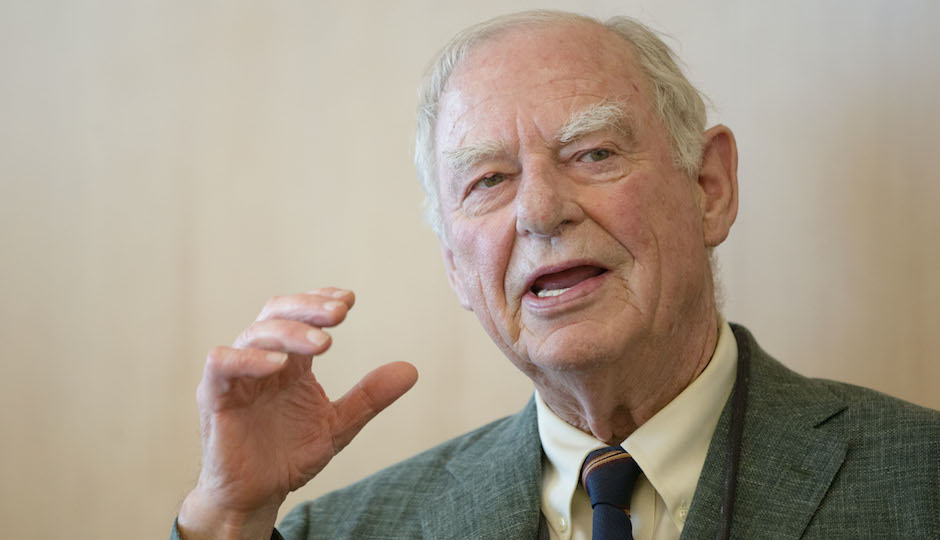The Last Days of the Philadelphia Inquirer?

Philanthropist H.G. “Gerry” Lenfest speak at a news conference after a closed-door auction to buy the The Philadelphia Inquirer and Philadelphia Daily News Tuesday, May 27th, 2014, in Philadelphia. Photo | AP, Matt Rourke
Let’s stipulate many things about Gerry Lenfest. That he’s a good man. A boon to the community. Somebody whose philanthropy has enriched this city beyond the usual ways of measuring. Philadelphia is better, much better, for his devotion to us.
But he is not the man to lead the Inquirer, Daily News, and Philly.com into the future — which is the plan, now that the auction he and Lewis Katz won two weeks ago has ended with Wednesday’s official closing, putting the organizations into his hands. His leadership may, in fact, signal the effective demise of those publications.
Let’s be blunt about the reasons why.
• FIRST: There’s his age. He’s in his 80s. And while he seems sharp and healthy — or did, at least, at the auction two weeks ago where he and Lewis Katz gained control of the papers — he has spent most of the last decade giving his fortune away. That’s the act of a man winding down his affairs, not of somebody taking on the greatest professional challenge of their life.
Guiding the newspapers to the future will take the vision and investment of a person (or persons) willing to see their efforts pay off over the course of years. Call this ageist, if you will, but Lenfest is not that person for one reason: Math is inescapable. And it seems he just parted ways with the one man positioned to offer him a youthful bridge to the future of those publications.
Lenfest’s ascension to the top of the masthead resembles nothing so much as Newsweek’s 2010 sale to deep-pocketed 90-something Sydney Harman. Harman died not long after. Newsweek went out of print for awhile; it continues on, almost unrecognizably diminished.
• SECOND: He’s ill-prepared. Ed Rendell has been running around the last week or so telling the public that Katz deliberately overpaid for the papers in order to preserve journalism and journalistic integrity. That’s probably not true. It’s clear that Katz expected George Norcross to outbid him for the papers, and was surprised when that didn’t happen. Katz and Lenfest were caught flat-footed, left with a huge obligation when they expected a payday. The two showed up to the victory press conference without a plan for personnel, or the papers’ digital figure, or any other idea how they wanted to run a business they supposedly wanted to own.
• THIRD: He’s relying on the wrong people. Let’s go ahead and try to give former publisher/owner Brian Tierney some credit: There are apparently a few reporters at the newspapers who, whatever his sins, remember him as a guy who backed journalism — and journalists — to the hilt.
Everybody else remembers him as the guy who steered the papers into bankruptcy. Because he went too deep in debt to buy them in the first place. And then took a pay raise even while the company teetered on the edge. While journalists took pay cuts. It’s something the Newspaper Guild remains angry about, I can assure you.
Now he’s a guy advising Lenfest on how to make the papers successful again. Ugh.
The entire newspaper industry in the United States has spent the last decade suffering and dying, trying to become something new. The papers in Philly have been dying faster than the industry as a whole. There’s no reason that should’ve been the case, but it is.
It may be that Gerry Lenfest is, in fact the last best hope of the papers. It may be that Gerry Lenfest offers the Inquirer its best route to survival. But if that’s the case, the Inquirer is probably on its last legs.
There’s only one real reason for hope, if you love these newspapers specifically or newspapers generally: This story has had so many twists and turns, has become so strange that it defies plausibility. We have said, time and again, “this story is just too weird” — then watched as it got weirder yet.
So maybe the papers can defy odds one more time. Maybe they can build their salvation from the foundation of an aged owner, a plane crash, and a misplaced auction bid. It would be a bizarre story, almost untellable in its byzantine set of turns. And it would be the most fittingly weird way for the papers to assure themselves a happy ending, at long long last.
That would be a nice story.
Follow @JoelMMathis on Twitter.


